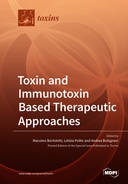Explore

Toxin and Immunotoxin Based Therapeutic Approaches
0 Ungluers have
Faved this Work
Login to Fave
In 1900, Paul Ehrlich, who was studying ricin and abrin at the time, discovered antibodies and paved the way for immunotherapy. After 120 years, Ehrlich’s insight into the therapeutic potential of immunotargeting is still a source of inspiration for many scientists. One of the most studied antibody-based targeting strategies is the carrying of powerful toxins. The generated molecules are immunotoxins, i.e., chimeric proteins obtained by coupling bacterial or plant toxins and antibodies through chemical linking or genetic engineering. Immunotoxins are functionally designed to eliminate the cells responsible for pathological conditions, and they find applications in several fields, ranging from cancer to immunological diseases or pain control. Despite the lack of specificity, even native toxins find clinical application, but the use of unconjugated toxins is limited to loco-regional treatments. A fundamental requirement for the medical application of toxins and their immunoconjugates is in-depth knowledge of their interaction with target cells in terms of binding, uptake, intracellular routing, and substrate specificity. This Special Issue focuses on toxins and immunotoxins that have clinical potential. We hope to give the reader a comprehensive overview of new toxin delivery strategies and toxin-based experimental disease models, both in vitro and in vivo.
This book is included in DOAB.
Why read this book? Have your say.
You must be logged in to comment.
Rights Information
Are you the author or publisher of this work? If so, you can claim it as yours by registering as an Unglue.it rights holder.Downloads
This work has been downloaded 113 times via unglue.it ebook links.
- 113 - pdf (CC BY) at Unglue.it.
Keywords
- 3D structure
- antibody drug conjugate
- antiviral agent
- cancer therapy
- Chenopodium quinoa wild
- COVID-19
- Diphtheria toxin
- Drug delivery
- DT3C
- epidermal growth factor
- epidermal growth factor receptor
- fusion proteins
- Glypican-3
- hepatocellular carcinoma
- Humanities
- humanized YP7
- immunoliposome
- immunotoxin
- kirkiin
- Monoclonal antibody
- n/a
- new recombinant immunotoxin
- patient-derived glioblastoma cell lines
- plant toxin
- pokeweed antiviral protein
- primary sequence
- prostate cancer
- Pseudomonas Exotoxin A
- quinoin
- ribosome-inactivating protein
- ribosome-inactivating proteins
- ricin
- SARS-CoV-2
- Social interaction
- Social issues & processes
- Society & culture: general
- Society & Social Sciences
- stenodactylin
- sugar specificity
- targeted toxins
- temozolomide
- toxic lectin
Links
DOI: 10.3390/books978-3-0365-3065-9Editions

